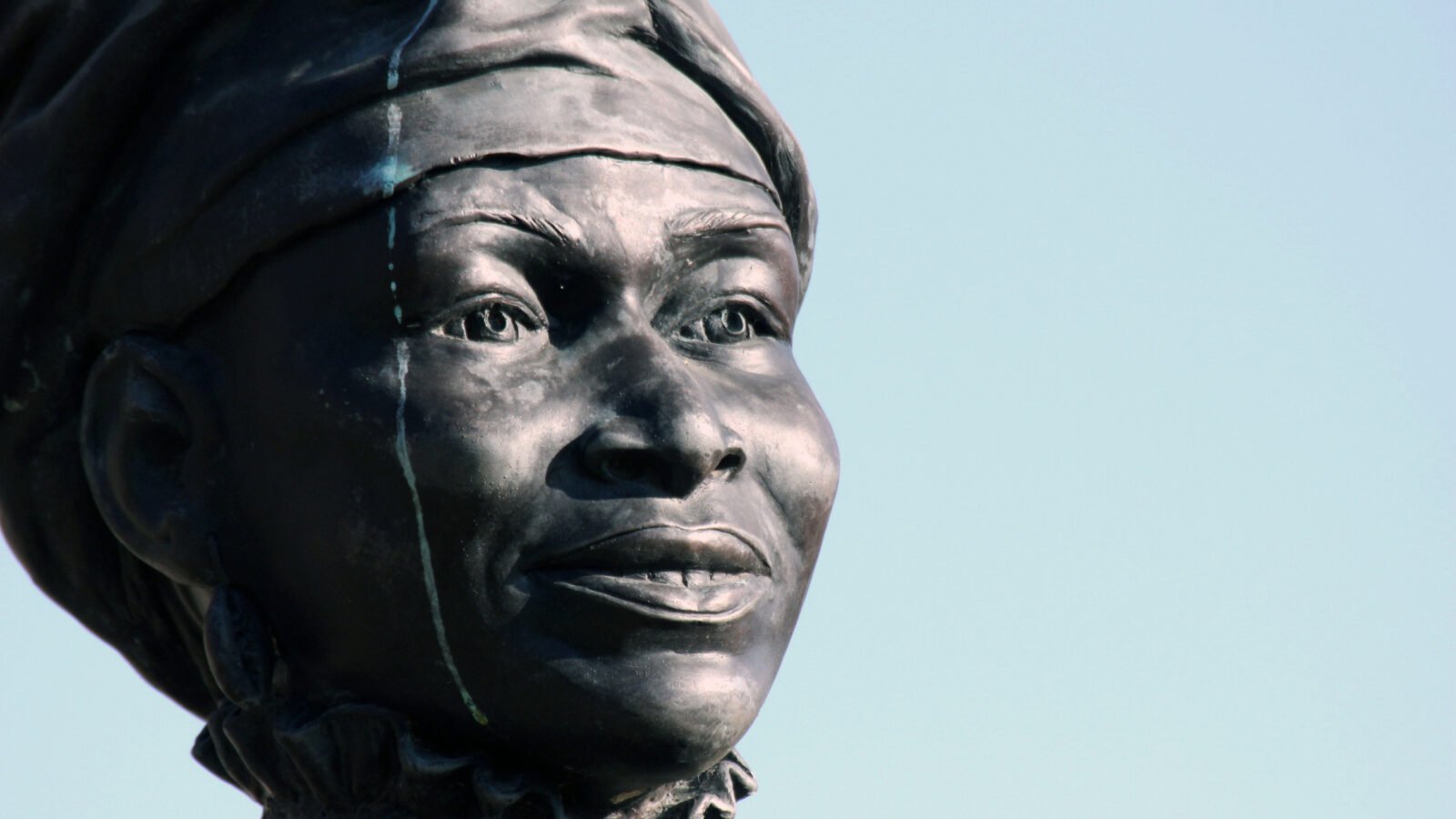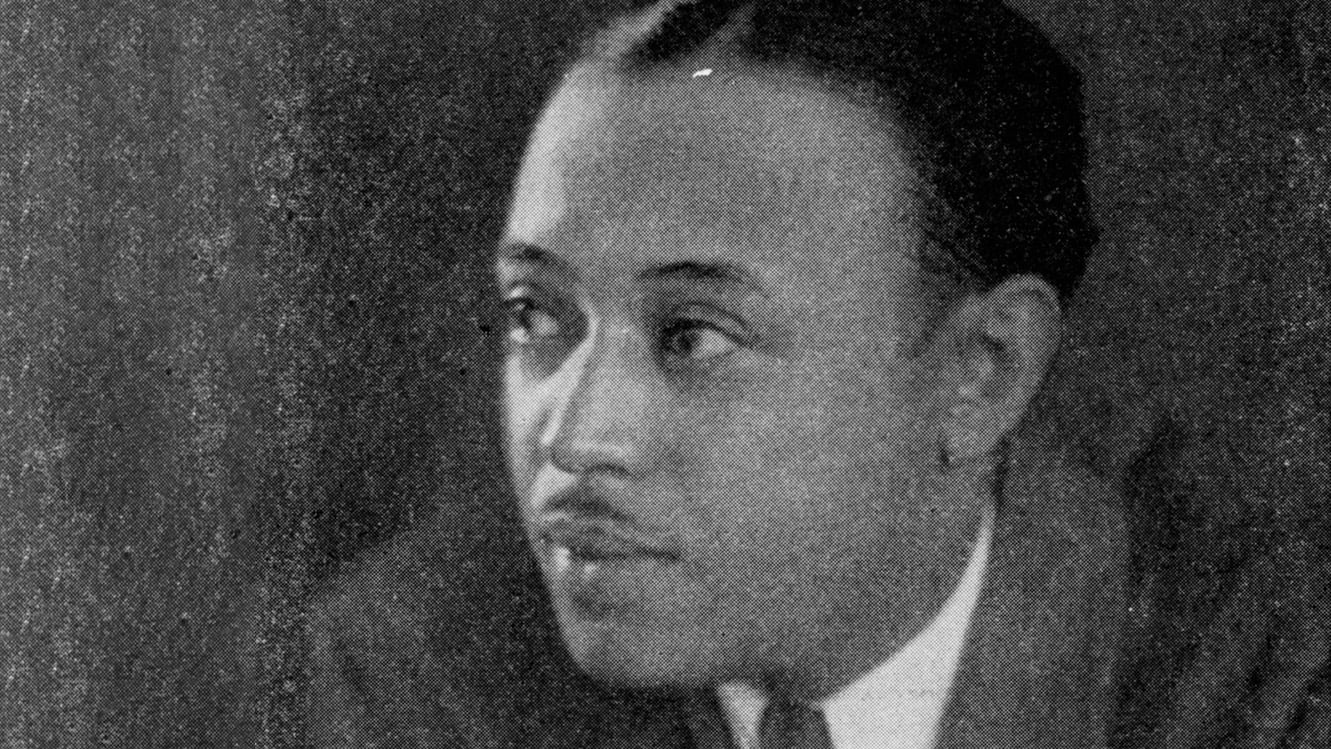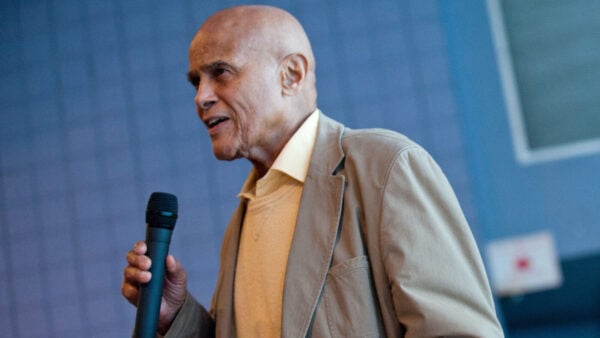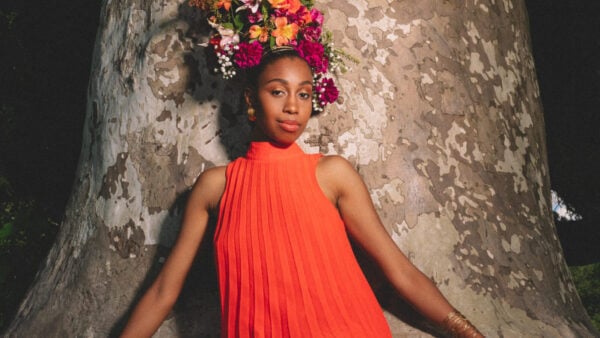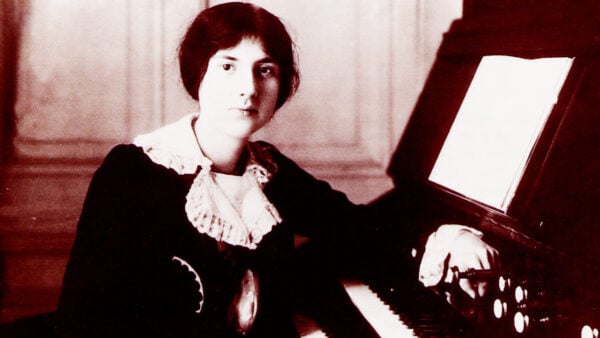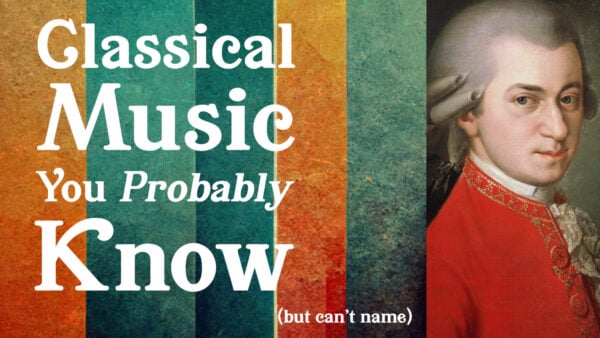Operas has long been a genre that demands excellence: from composers to performers, set designers, and everyone between. Yet this quest for excellence has also been historically marred by exclusion.
Opera's high barrier to entry has often served to leave artists from historically marginalized groups behind.
The excellent work of Black composers, paired with tireless advocacy from artists, audiences, and administrators, has resulted in more operas by Black composers being presented on the world's biggest opera stages. UNC Professor Naomi André, an expert in Black artists' contributions to opera, considers our current times a "golden age" for Black opera.
These achievements have been hard-won. And as you will see, there is so much more ground to cover. Glaringly, many watershed works have not received performances since their premieres, if those ever took place at all.
But these works are vital. Not only do these works hold exquisite music, they present Black stories onstage. Let's look back and celebrate these operas you should know by Black composers.
1. The Martyr
Music and libretto by Harry Lawrence Freeman. Completed and premiered in 1893
Harry Lawrence Freeman, born in Cleveland in 1869, is considered the first African American composer to write an opera. The inaugural work, The Martyr, was first performed in Denver in 1893, then in Chicago that same year and Cleveland the following year.
Set in Ancient Egypt, the opera follows the trials of Platonus, a nobleman who is forced to choose between his true religious convictions and the prevailing Egyptian beliefs.
The composer would go on to write the music and librettos for many more operas — most notably Voodoo and Leah Kleschna. According to the Harry Lawrence Freeman Foundation, the most recent full performance of a Freeman opera was a semi-staged Morningside Opera, Harlem Opera, and Harlem Chamber Players presentation of Voodoo in 2015, with individual Freeman arias being performed very occasionally.
2. Treemonisha
Music and libretto by Scott Joplin. Completed in 1911, premiered in 1972
First performed in its entirety more than 60 years after its composition and 55 years after the death of its composer, Treemonisha tells the story of a freedwoman, the title character, as she overcomes ignorance and persecution to educate and lead her community in Texarkana, Texas.
Today, Scott Joplin is practically synonymous with ragtime. But this opera transcends that tradition to incorporate folk, operetta, and symphonic sounds.
In 1976, Joplin was posthumously awarded the Pulitzer Prize for Music for this opera.
3. Tom-Tom
Music and libretto by Shirley Graham Du Bois. Premiered in 1932.
Beginning in West Africa, then on a plantation in the southern US, and finally in Harlem, Shirley Graham Du Bois’ monumental Tom-Tom: The Epic of Music and the Negro depicts the enslavement and transformation of Black people and the evolution of Black music in the United States.
Considered the first opera by a Black woman to be presented by a major opera company, audiences flocked to the work’s 1932 premiere in Cleveland. Over two performances, about 25 thousand people are said to have seen the work, which was shared in the city’s giant Municipal Stadium.
Du Bois remained active in performing arts for another decade before transitioning into writing and political pursuits.
Graham Du Bois — and her husband, civil rights activist W.E.B. Du Bois — were tireless in their work towards civil rights and left-wing causes and openly supported the American Communist Party. By 1961, Shirley Graham Du Bois and W.E.B. Du Bois has immigrated to Ghana from the US.
The opera was rediscovered after the composer’s son donated his mother’s manuscripts to Harvard University in 2001. New York State’s Caramoor Center streamed excerpts from the work in 2020, but the work has not received a fully staged production since its premiere almost a century ago.
4. Troubled Island
Music by William Grant Still, libretto by Langston Hughes and Verna Arvey. Completed in 1939, premiered in 1949.
Troubled Island is the best-known opera of William Grant Still, the “Dean of African American composers.” Set during the Haitian revolution, the work dramatizes the life of the Haitian emperor and freedom fighter Jean-Jacques Dessalines.
The work began as a collaboration of two of the most distinguished Black artists of the 20th century: Still and writer-advocate Langston Hughes. However, Hughes could not finish the project (he went to Spain to cover the civil war). And so, pianist Verna Arvey, who was married to Still, completed the libretto, her first.
Although the work was completed in 1939, it would be another decade before it received its first performance at the New York City Opera in March 1949. And a much longer gap stood between its premiere and second run. Excerpts from the work were shared in a 2009 concert performance, but the second full staging of the opera took place in 2013 by Chicago’s South Shore Opera Company.
In a 2022 interview with WFMT, Judith Anne Still, daughter of William Grant Still and Verna Arvey, maintained that this title was her favorite opera written by her father.
5. X: The Life and Times of Malcolm X
Music by Anthony Davis, libretto by Thulani Davis, story by Christopher Davis. Premiered in 1986.
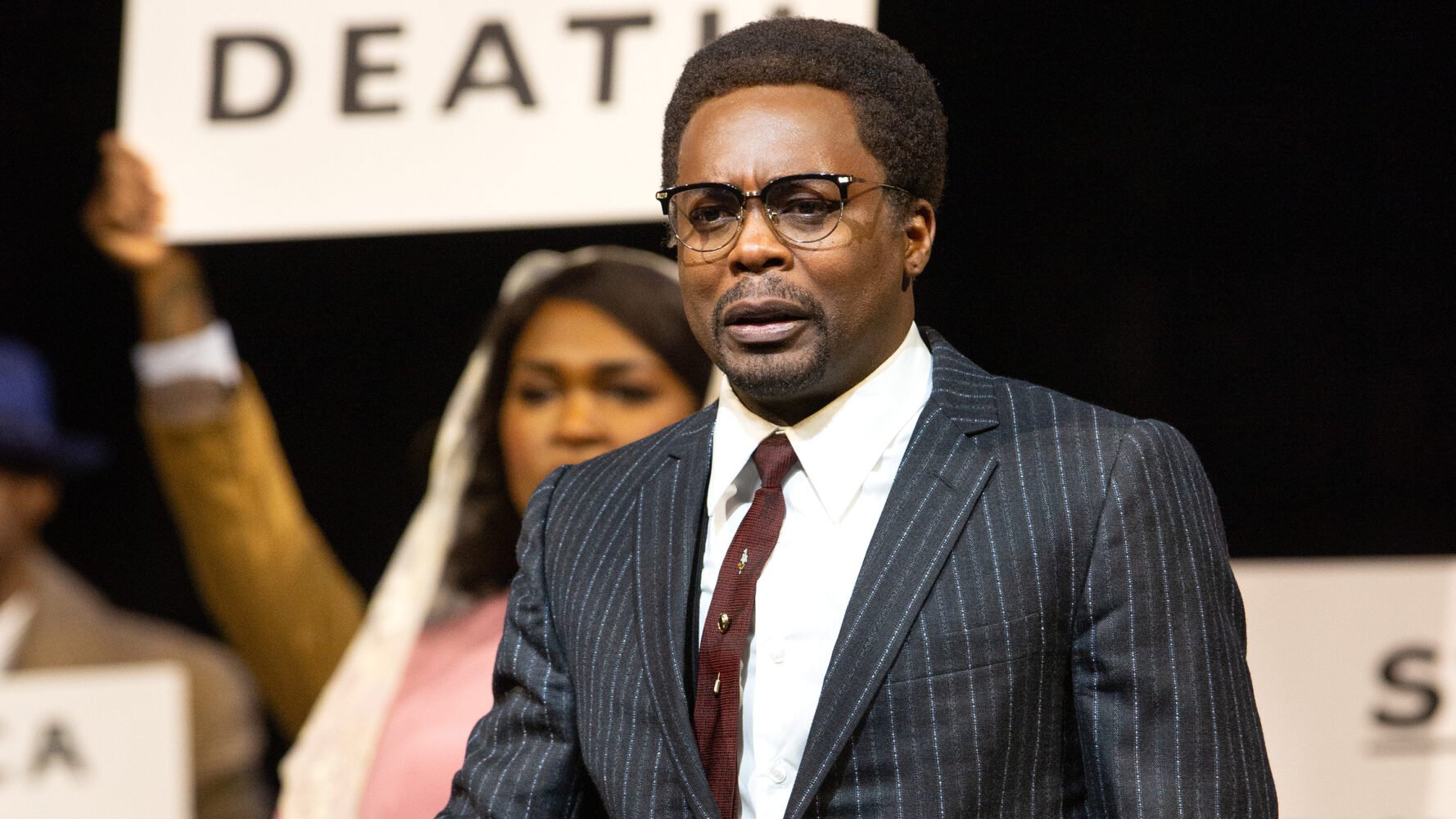
Will Liverman as Malcolm in Anthony Davis's X: The Life and Times of Malcolm X (Photo: Marty Sohl / Met Opera)
In this work, premiered just over 20 years after Malcolm X’s assassination, Anthony Davis mines the life and work of the fiery Civil Rights leader.
Over twelve vignettes spanning Malcolm X’s life, the opera traces the political and spiritual growth of its historic title character and his lasting legacy.
The work is very much a family production. Davis’s brother, writer Christopher Davis, guided the story and structure for the work, while journalist, poet, and playwright Thulani Davis — the composer’s cousin — supplied the libretto.
6. Joshua’s Boots
Music by Adolphus Hailstork, libretto by Susan Kander. Premiered in 1999.
Adolphus Hailstork’s Joshua’s Boots turns a lens to a neglected passage of history: the many formerly enslaved people who, post-Emancipation, moved West and became cowboys.
With a libretto by Susan Kander, the 1999 Western work bills itself as an educational opera and was conceived to be suitable for younger audiences.
It follows a young man, Joshua, who opts for the life of a cowboy over the army life of a Buffalo Soldier. With saloon settings and true cowboy songs, the Lyric Opera of Kansas City and Opera Theater of St. Louis co-commissioned work transports its audiences to late 19th-century Kansas and the quick-changing social and political context of the day.
7. Harriet Tubman: When I Crossed That Line to Freedom
Music and libretto by Nkeiru Okoye. Premiered in 2014.
Nkeiru Okoye’s 2014 work sees the composer in dual roles. Not only did she write the music, but she also adapted highly acclaimed biographies of the revolutionary abolitionist to create the libretto for the piece.
The work focuses on Tubman’s family and inner circle, grounding the legendary figure by putting special emphasis on the bond Harriet had with her younger sister, Rachel Ross.
Commissioned by American Opera Projects, Tubman’s first performance took place under the baton of conductor Leslie B. Dunner in Brooklyn, NY, and in 2016, Dunner conducted a performance by Chicago’s South Shore Opera Company.
8. Fire Shut Up in My Bones
Music by Terence Blanchard, libretto by Kasi Lemmons. Premiered in 2019.
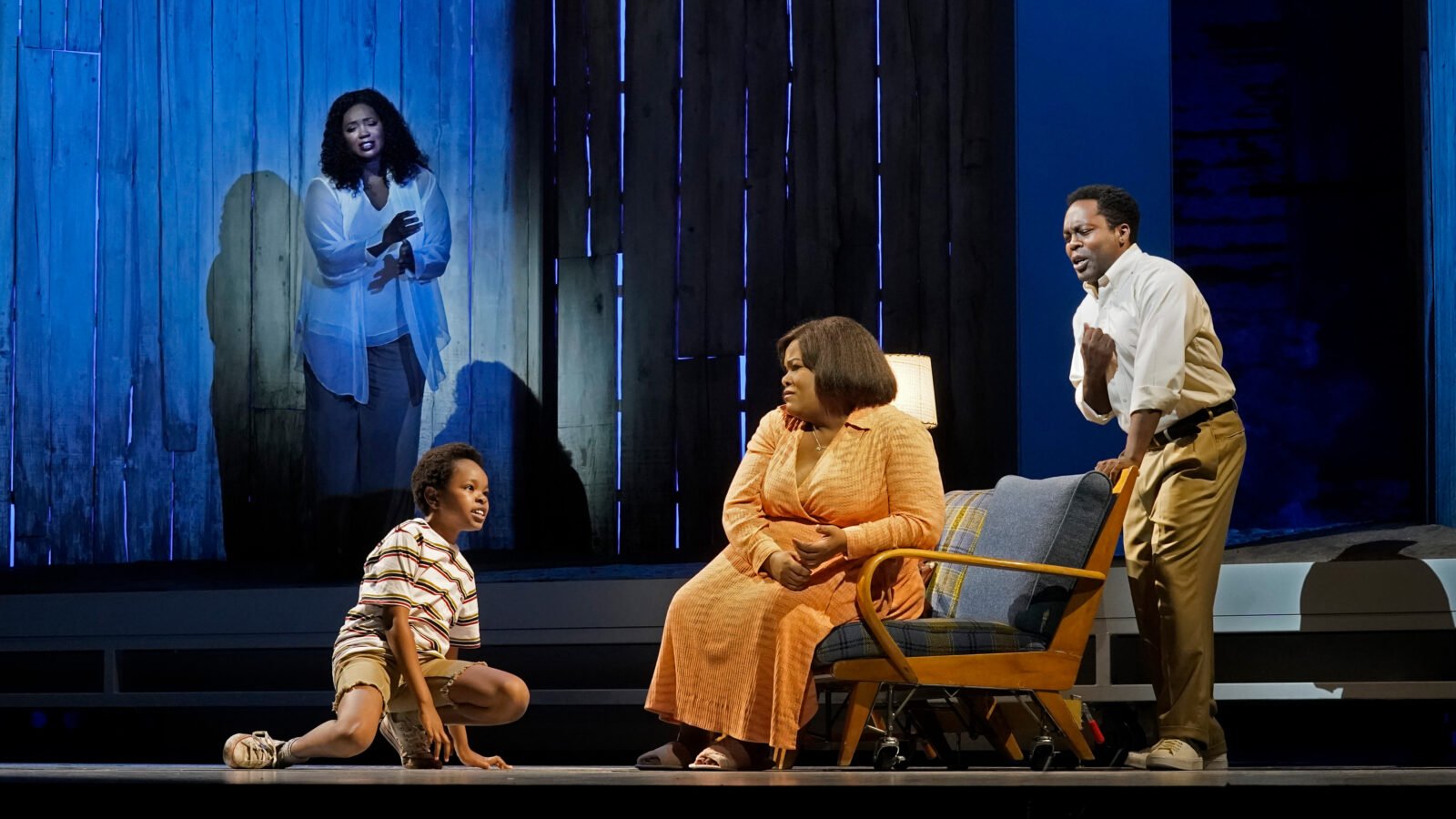
Angel Blue as Destiny, Walter Russell III as Char’es-Baby, Latonia Moore as Billie, and Will Liverman as Charles in Terence Blanchard's Fire Shut Up in My Bones (Photo: Ken Howard / Met Opera)
Terence Blanchard’s 2019 opera adapts Charles M. Blow’s memoir, tracing the author’s life as he overcomes trauma and challenges.
The work was chosen to mark the grand reopening of the Metropolitan Opera, ending the opera house’s unprecedented 18-month closure during the COVID pandemic. The presentation holds an even more significant milestone. Shockingly, it was the first opera by a Black composer presented in the Met’s then-nearly 140-year history.
It was performed in Chicago at the Lyric later that same season, and in February 2023, the opera won the Grammy Award for Best Opera Recording.
9. The Snowy Day
Music by Joel Thompson, libretto by Andrea Davis Pinkney. Premiered in 2021.
The Snowy Day is based on the Caldecott Medal-winning children’s book by Ezra Jack Keats that tells the story of Peter, an African American boy, as he experiences his first snowfall.
Keats was not Black, but the book was noteworthy for portraying a Black child in a protagonist role in a time — the early 1960s — where children’s books and characters were from a white vantage point by default.
Joel Thompson, who composed the oratorio Seven Last Words of the Unarmed, teamed with children’s author Andrea Davis Pinkney, to create an immersive, free-flowing, family friendly opera.
10. Omar
Music by Michael Abels and Rhiannon Giddens, libretto by Rhiannon Giddens. Premiered in 2022.
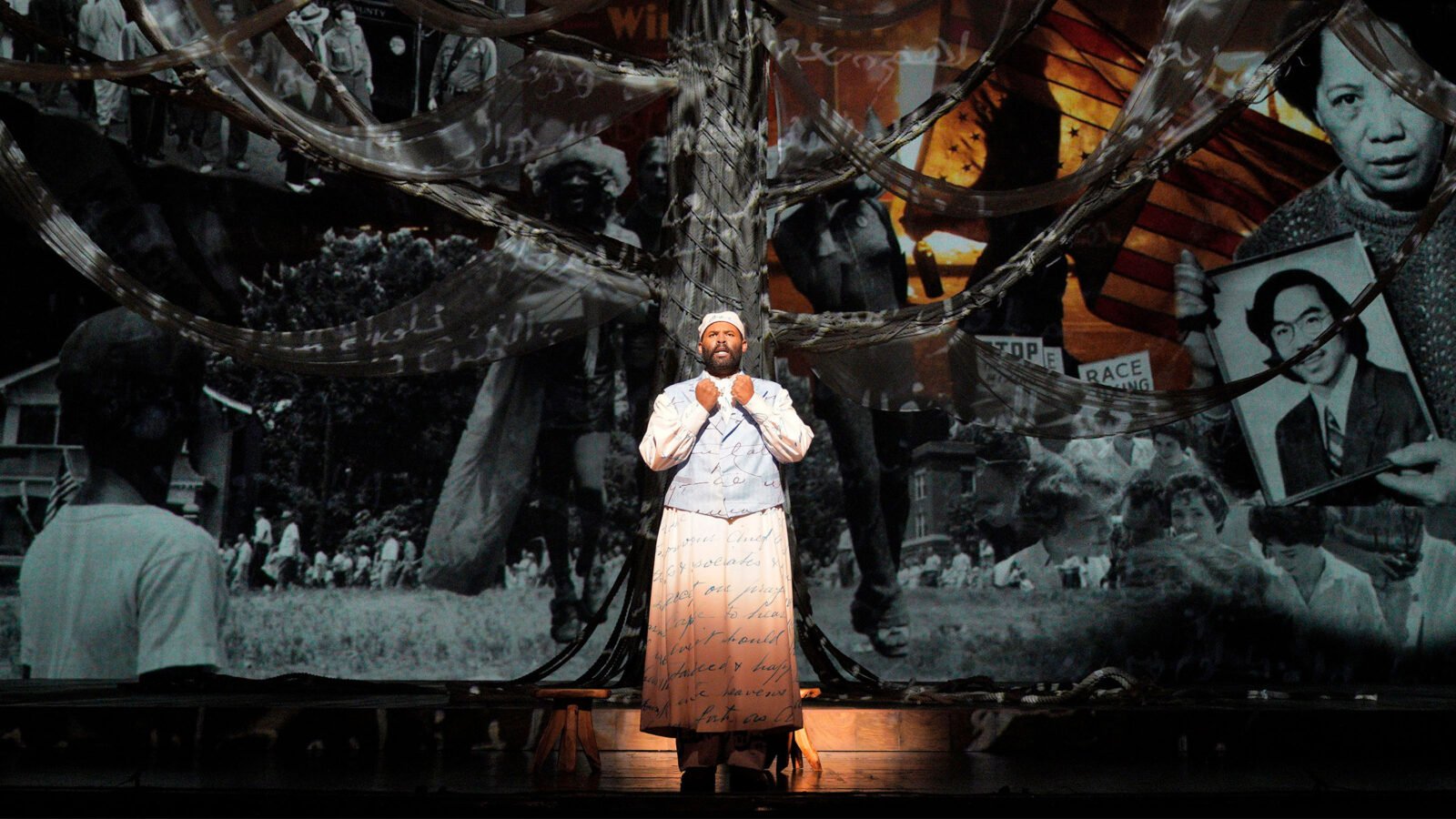
A scene from Omar (Photo: Cory Weaver)
Two leading composers — Michael Abels and Rhiannon Giddens — joined forces to create Omar.
Based on the autobiography of Omar Ibn Said, an enslaved Muslim man who lived in 19th-century South Carolina, the work received its premiere in 2022 at Spoleto Festival USA (in South Carolina), and has already been performed at LA Opera and Boston Lyric Opera, with stints in San Francisco and Chicago on the horizon. Omar received the 2023 Pulitzer Prize in Music.
Both Abels and Giddens exemplify the 21st-century composer. Giddens is a respected singer-songwriter in the blues/folk space with highly successful entries into the classical canon. Meanwhile, Abels is a highly in-demand composer with acclaimed film scores and orchestral works alike.

